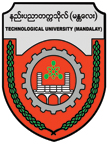
Department of Electronic Engineering (EC) provides an Electronic engineering education to our graduates and post graduate students. The Department of Electronic Engineering has been established since the Government Technical Institute, Mandalay was opened in 1955. Department started Under Graduate program in the year 1995 and the Post-Graduation Programme was started in the year 2008. Therefore, Department of Electronic Engineering of TUM is 63 years old in engineering education service.
Motto
“LET’S COMMUNICATE TO THE WORLD”
Vision and Mission of Department of Electronic Engineering
Vision:
The programming will be recognized by international in Electronics and Communication field with research focus catering to the needs of our community.
အီလက်ထရောနစ် အင်ဂျင်နီယာဌာန၏ မျှော်မှန်းချက် (Vision)
ကျွန်ုပ်တို့ လူ့အဖွဲ့စည်း၏ လိုအပ်ချက်များအပေါ် အခြေခံသော အီလက်ထရောနစ်နှင့် ဆက်သွယ်ရေးနည်းပညာဆိုင်ရာ သုတေသနလုပ်ငန်းများ ဆောင်ရွက်လျှက် နိုင်ငံတကာ အသိအမှတ်ပြုဌာနတစ်ခု ဖြစ်ပေါ်စေရမည်။
Mission:
- To do continual development by reviewing and prescribing modernized curriculum in electronics and communication technologies
- To hold seminars, workshops, conferences and trainings program for upgrading the teaching capacity of the staff
- To create better learning environments for students
- To equip with practical and laboratory facilities for better performance
- To encourage research projects
- To implement better quality management system in the department
အီလက်ထရောနစ် အင်ဂျင်နီယာဌာန၏ ဆောင်ရွက်ရန် တာဝန် (Mission)
၁။ အီလက်ထရောနစ်နှင့် ဆက်သွယ်ရေးနည်းပညာဆိုင်ရာ ခေတ်မီ သင်ရိုးညွှန်းတမ်းများ ပြဌာန်းခြင်း၊ သုံးသပ်လေ့လာနေခြင်းနှင့် စဉ်ဆက်မပြတ် ဖွံ့ဖြိုးရေးလုပ်ငန်းများ ဆောင်ရွက် သွားရန်။
၂။ သင်ကြားရေးဆရာ၊ဆရာမများ၏ သင်ကြားမှုစွမ်းဆောင်ရည်မြင့်မားရေးဆိုင်ရာ အစီစဉ်များ၊ လေ့ကျင့်ပညာပေးမှုနှင့် ပညာရပ်ဆိုင်ရာ seminar များ၊ workshop များ၊ conference များ ကျင်းပနိုင်ရန်။
၃။ ကျောင်းသား၊ကျောင်းသူများအတွက် သင်ယူမှုပတ်၀န်းကျင်ကောင်းများ ဖန်တီး ဖော်ဆောင် သွားရန်။
၄။ ဓါတ်ခွဲခန်းများနှင့် လက်တွေ့လေ့ကျင့်မှုဆိုင်ရာ ပစ္စည်းများ ပြည့်စုံကောင်းမွန်စေရေး ဆောင်ရွက်ရန်။
၅။ သုတေသနလုပ်ငန်းများ အားပေးဆောင်ရွက်ရန်။
၆။ ဌာနတွင် အရည်အသွေး စီမံခန့်ခွဲမှု ကောင်းမွန်ရေးအတွက် အမြဲမပြတ်လေ့လာ အကောင်ထည်ဖော်ဆောင်ရွက်ရန်။
Degree Award
- Bachelor of Engineering (Electronics)
- Master of Engineering (Electronics)
Research Area/ Field
- Control System
- Microelectronic and Embedded Technology
- Networking and Communication System
- Signal Processing
Laboratories and Workshops
Laboratories and particles are important part of the Electronic Engineering curriculums. Department of Electronic Engineering has the follwing laboratories:
- Circuit Lab 1 (Dept:)
- Circuit Lab 2 (Workshop)
- PLC Programming Methods and Techniques Lab (Dept:)
- Technical Programming Lab (Main Building R 214)
- Networking and Communication Lab (Dept:)
GRADUATE ATTRIBUTES
Students of an engineering programme are expected to attain the following GAs:
- Acquire and apply the knowledge of basic sciences and engineering, and mathematics to fix complex engineering problems.
- Apply fundamental principles of mathematics and engineering science to identify study, formulate and evaluate effectively with efficient conclusions.
- Propose appropriate solution for complex engineering problems and design systems, components or processes considering cost-effectiveness and concerning with public health, safety and environment.
- Make use of specialized knowledge through research-based methods with strong critical thinking to apply, identify, analyse, study and design innovative solutions for complex problems related to electronic engineering to provide valid conclusions.
- Apply appropriate electronic engineering techniques to model, simulate and analyse complex electronic engineering systems within the relevant constraints and range of validity.
- Apply the contextual knowledge to assess societal, health, safety and cultural issues and endure the consequent responsibilities relevant to the professional engineering practice.
- Ability to understand the significance of sustainable development and impact of professional engineering solutions in societal and environmental contents.
- Understand principles of professional and ethical responsibilities when practicing the engineering course.
- Display ability to work proficiently in the context of a various team within multi-control environment, as an individual member with teamwork fortitude or as an inspiring leader with valuable management skills.
- Communicate effectively in both oral and written form.
- Show ability to understand and improve engineering and management skill to manage electronic engineering projects, as a member or a leader on a team realising the importance of cost-effective design and solution for sustainable development.
- Recognize the significance of life-long learning and continuous self-improvement in the context of scientific and engineering advancement and professional development.
Performance Indicator for Graduate Attributes
|
Graduate Attributes |
Performance Indicators |
|
GA1 |
· Engineering Knowledge |
|
GA2 |
· Problem Analysis |
|
GA3 |
· Design/Development of Solutions |
|
GA4 |
· Investigation |
|
GA5 |
· Modern Tool Usage |
|
GA6 |
· The Engineer and Society |
|
GA7 |
· Environment and Sustainability |
|
GA8 |
· Ethics |
|
GA9 |
· Individual and Team Work |
|
GA10 |
· Communication |
|
GA11 |
· Project Management and Finance |
|
GA12 |
· Lifelong Learning |
Programme Educational Objectives (PEOs)
PEO1: Apply the engineering knowledge and skills, complex problem-solving skills and critical thinking in professional engineering practices.
PEO2: Adopt ethical and moral behaviour and exhibit effective skills in communication, management, teamwork, and leadership qualities.
PEO3: Engage in ethics and lifelong learning of electronic engineering to attain professional excellence and also in other allied fields.
Assessment Indicators of
Programme Educational Objectives (PEOs)
PEO1: Technical Competence
PEO2: Communication Skills/ Leadership
PEO3: Professional Ethics / Lifelong Learning
